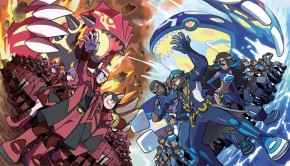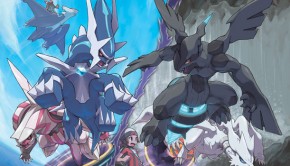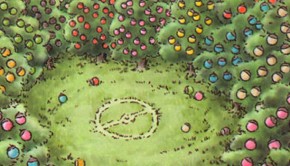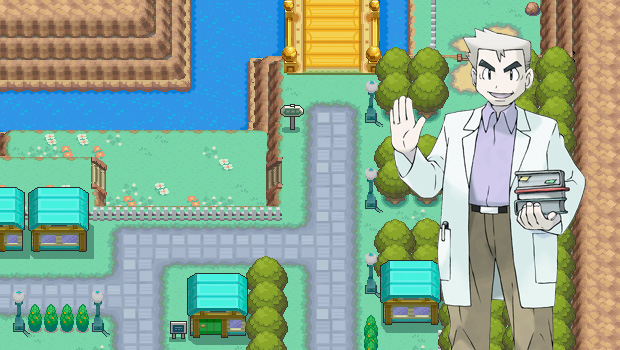Caution! Trainer Under Pressure: Sportsmanship in VGC Play
Scenario: it’s the Top Cut of a National Championship and you’re one turn away from moving on to the next round and winning a free trip to the World Championships. The game is all but yours… But wait! You’ve missed an attack and now your opponent is moving on and you’re left behind, shocked and unable to understand how you lost. How do you react, and how does your opponent react?
Win or lose, its important to be humble. When all is said and done, people won’t remember the results of an individual battle. What people will remember in the long run is how you act after a battle, with those who are humble being remembered positively while those who whine, complain and continue to justify their losses are not so lucky. While that one particular battle may seem to be the most important moment in your life at the moment, this isn’t the case. Emotions may be high, but it’s more important to keep your cool and move on. If you’re having trouble with that, well, that’s what this article is for! In this article, I’ll be discussing both how and why you should be respectful to your opponent, covering both the winning and losing sides, regardless of luck.
The Losing Side
You get out of a battle, and you’ve just lost. You’re FUMING. The opponent just dunked you with two critical hits and a pivotal Heat Wave miss, and there was nothing you could do about it. You want to rage, call hax, throw your DS across the room, complain to your friends — something to vent. Unfortunately, it won’t help.
In fact, raging, blaming hax, and complaining do much the opposite. While you are thinking only of yourself, you also end up embarrassing the opponent. They, too, had no control over what happened, and you’re blaming the game for them winning, discounting any skill that got them into that position. While it may not have been fair and there may not have been anything you could have done, it doesn’t mean that the opponent should feel bad about it either. They got themselves into a position where those results won them the game, and even if they were outplayed or had a worse team, that was the way the cookie crumbled. “But people think I’m bad then,” you say. “But I really played better,” you say. Well, both may be true, but you don’t need to attack your opponent to prove anything. Having the right attitude when losing a battle can not only help you be a better opponent and member of the community but better in training and preparation as well. Having the right attitude means looking at your loss and seeing how you could have put yourself in an even better position, to the point where no amount of luck could have saved your opponent.
However your opponent reacts after getting lucky or simply outplaying you, you should be respectful. Let’s cover the reactions and expand on the reasoning behind the proper way to go about them.
If the opponent basks in their glory...
Simply congratulate them on the win and walk away, no matter how angry you are. This is one of the hardest things to do at an event, especially at higher levels. Calm down, shake it off, and let them have their 15 minutes of fame. You do dumb things at an escalated pace when you are angry, so take a breather. Go get a soft pretzel and a water. Talk with some friends, and see how their battles went. Afterward, once you are calmed down, go talk to your opponent about what happened and explain to them how it felt. Help them understand how they should have been more of a good sport, and be willing to forgive them. You do not want revenge, you want peace.
If the opponent understands…
GREAT! Allow them to apologize, put it all in the past, and shake their hand afterward. You will both be better because of it. They will be a better opponent down the road, and you will be more respected as someone who is helping out the community.
If the opponent continues to gloat…
Then let them be. Completely ignore them afterward. If someone asks you about their attitude, decline comment. Don’t say anything negative about them, but instead find someone that you know will be able to help them out (such as one of their friends, a staff member, a well-respected player, etc.) and have them talk to the player. Whatever you do, don’t make the situation worse than it already is.
If the opponent is humble…
Congratulate them on their victory, laugh off the bad luck, and wish them success going forward. In Swiss tournaments, you want your opponent to do well, so having them keep their spirits up and their mind fresh and stress free is the best way to ensure they do well to help YOU out down the road. Give them some pointers if they misplayed at certain junctures, encourage them to do well, and make sure they understand that you’re cheering them on. Anything to help you both do better in the future. Remember, if you want your battles to be worth something, you need to play good players, and you can help your opponents become better when they defeat you. Whether or not the opponent actually plays better than you in that game does not matter — the scoreboard is final, and no words can change that result. While posting your battle video is fine, don’t use that as an opportunity to demean them — this can (and will) backfire on you. Always return a humble attitude with another humble attitude.
Cliff Notes
Things to do when you lose:
- Shake the opponent’s hand. Make them understand you respect them.
- Give them any pointers that you feel could help them later in the day.
- Keep their spirits up. Give them a mental pat on the back. Motivation helps at a long event.
Things not to do when you lose:
- Get angry. It’s a game, and it’s meant to be fun. If you’re getting worked up, take a step back and take a deep breath.
- Complain about things, especially bad luck. Whining gets you nowhere and does not prove anything. Let your battles speak for you.
- Demean your opponent. Do not accuse them of being a bad player. If you feel their skill is an issue, talk with them and help them out. If they’re that bad, and you lost to them, what does that make you, anyways?
![]()
THE WINNING SIDE
You just dunked your opponent 4-0 and you are feeling like the man of the year! You want to jump up, cheer loudly, high five your friends, and run around the convention center shirtl-…OK, maybe not that, but you’re pretty excited. However, your opponent is feeling pretty bummed, and he’ll only feel worse if his opponent is a complete jackwagon. Don’t be one of those people who takes off running and screaming after they win, attracting everyone’s attention and looking like a 5-year-old hyped up on caffeine in a candy store. No one wants to see that, especially the guy you just beat. Treat him with respect; his record, if in a Swiss tournament, may come back to help you later if he plays well the rest of the day.
Your opponent may react differently though for each battle. Here are some examples:
If your opponent is humble:
Awesome. Shake his hand, and congratulate him on the battle. Give him a few pointers on what he could have done better if you noticed something wrong. Wish him luck on the rest of his day, and keep track of how he’s doing, especially if he gets down in the dumps later on. In a Swiss-style tournament, staying motivated is hard once you know you’re pretty much done. Keep them inspired and you may be rewarded down the line.
If your opponent is upset:
Well, it happens. People get upset over a game that’s intended for fun, and you have to deal with it. Console them, help them regain focus on having fun. It’s fun first, hard mode second. Remind them that they came to enjoy themselves, not to sulk over what could have been. Help them put it behind them and encourage them to do better in the coming matches.
If your opponent is angry:
AWKWARD! You kind of feel like the biggest jerk. But don’t. They have no reason to be getting mad over a game. Calm them down the best you can. Make sure you’re feeling fit and spry so you can avoid anything they throw at you and make sure they don’t flip a table with your DS on it. Okay, that never happens, but if it does, that’s what staff is there for. In most cases, just try to calm them down and remind them they’re at the event to have fun. Don’t do anything to antagonize them, and if you notice that they are particularly angry, just walk away and let them calm down. Never escalate the situation.
If the opponent is a jerk:
It can happen. People are going to flip you off, give you an extremely demeaning smirk, tell you some nasty things, refuse to shake your hand, and walk away smiling and cocky. Just ignore them and talk to a friend, a staff member, or a well-known player to try and reform them. With people like this, there’s nothing you can do about it. Better to move on and try not to let it shake you for the rest of the tournament.
Cliff Notes
Things to do when you win:
- Thank the opponent for the match. Most of the time they will appreciate the battle, win or lose.
- Discuss the battle. Talk over why you made the decisions you did, and find out why your opponent made the decisions he did. This will help both of you in future matches.
- Encourage, encourage, encourage. Keep their spirits up. Make sure they continue to do well the rest of the day. They should walk away from the battle in a positive mindset despite the loss.
Things not to do when you win: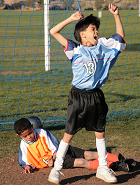
- Showboat. You can get excited, but don’t go over the top. Don’t make the opponent feel bad in your celebration.
- Demean your opponent. Keep it positive. Don’t tell them they suck, laugh at their team, or call them names.
- Brag. You are not the best, and if you are, don’t act like you’re the chosen one. Let your battles do the talking. Your opponent doesn’t want to hear it, either.
Final Thoughts
- I’m going to bold this because this is huge: BLAMING THINGS ON LUCK IS NEVER BENEFICIAL. While the opponent may have had extremely good luck and you had awful luck, it does not help to go on a verbal rampage about how bad your luck is. No one cares. Everyone has bad luck. You just have to be that much better of a player to get past it. After all, saying, “I got a few unfortunate misses, but the opponent was in position to take advantage of that,” is a much better explanation than, “I only lost because he got lucky, but I am a much better player than he is.” Let the battle videos and the results do the talking. You are playing a game that has many “luck” factors programmed in, so getting upset and being a poor sport disrespects the game and the players. Work on what you can control; laugh at what you can’t. You are there to have fun. Complaining about luck will never help anything grow except your ego.
- Both of you should walk away from the battle better than you came in. If you’re both relaxed after the battle, talk it over — at least one of you will learn something. Talking moves over and understanding other playstyles is a very good way to learn the game quickly, and help you understand what future opponents might do.
- Your opponent’s record may come in handy if you end up dropping a game in a Swiss tournament. Make sure they keep playing at their highest level throughout the tournament and you may be rewarded.
- Refusing to blame losses on luck gives you more perspective on what you can control. Blaming battles on things other than your own skill is a trap a lot of players fall into, and those players never seem to improve. If you’re relying heavily on luck, you’ll never go far consistently. You need to have some luck, to be sure, but you also need to play smart. Understand what you can control and make that part as flawless as possible.
- This is the most important thing to remember: you’re playing the game for fun. Don’t get angry, upset, sad, or moody. Stay positive. Make that a goal while practicing, too. While it may be frustrating at times, understand that in the big picture you and your opponent are there to have fun. Be a good sport and keep your head up all day.
A simple attitude check can help ensure that you get the most out of your battles and give your opponents the most too. After a battle, be respectful and walk through the battle with your opponent. Win or lose, you can both learn something from the other and walk away better than you came into it. Once you make that a goal, you will continue to improve and become a better player, person, and member of the VGC community every day.



